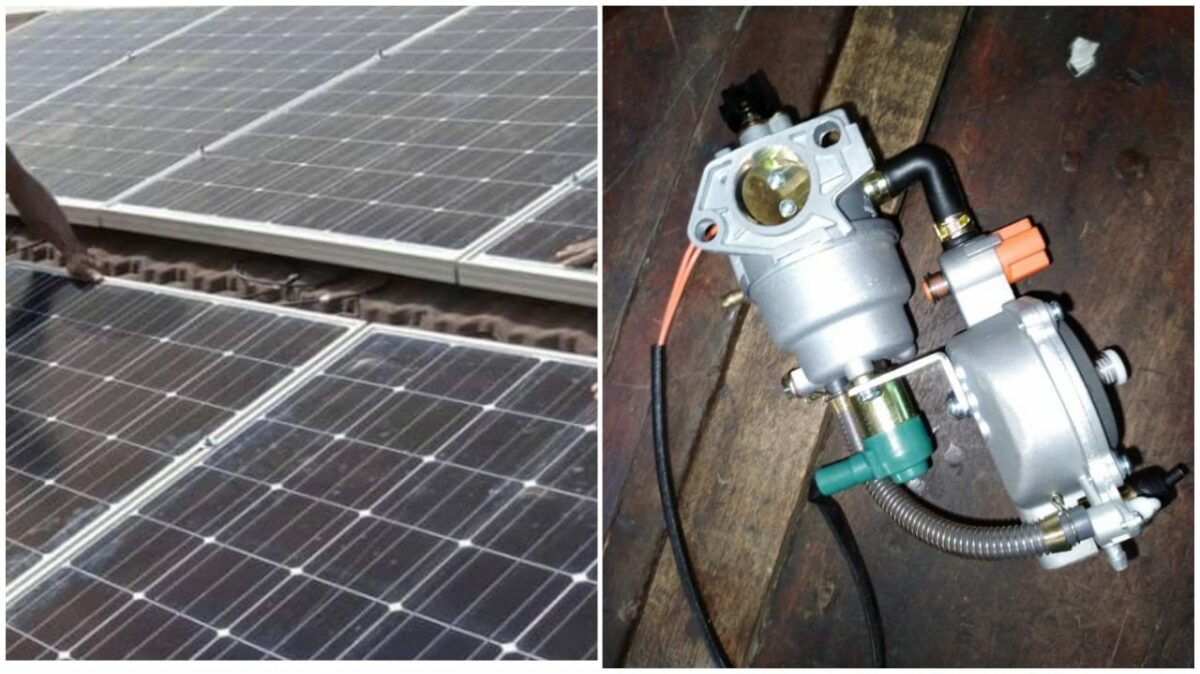In this FIJ report, Abimbola Abatta examines the various methods through which Nigerians are mitigating the consequences of the removal of fuel subsidy. The article also sheds light on the challenges faced in implementing these alternative approaches.
When President Bola Tinubu boldly said “Fuel subsidy is gone” during his inaugural address on May 29, 2023, Ayoola Yusuf, a fashion designer from Ogun State, was taken aback. Little did he know what awaited him — petrol prices reaching N500 per litre and beyond.
“It came as a rude shock. I went from buying a litre of petrol between N185 and N195 to buying at more than double the previous price,” Yusuf told FIJ.
Yusuf, like many other Nigerians, relies on electricity to power his fashion design business, which entails using industrial machines, pressing irons and other equipment.
Before the fuel subsidy was removed, he could fuel his generator with 30 litres of petrol for N5,550 at the rate of N185 per litre, but immediately after the subsidy was lifted, he found himself paying N15,000 for the same amount of fuel at N500 per litre. Considering the power requirements of his appliances, this was an unsustainable situation.
With many other Nigerians forced to adjust to this new reality of high fuel prices, Yusuf is not alone. Wasiu Fagbohun sells phones and phone accessories in Ogun State. And he also relies on a generator to power his shop in Ijebu Ode.
GAS-POWERED GENERATORS TO THE RESCUE
When the exorbitant cost of petrol was no longer sustainable for Yusuf and Fagbohun, they decided to explore an alternative solution: converting their petrol generators to cooking gas-powered systems.
How did the duo do it? They bought a carburettor each and had their engineers fix the gadget to their generators towards the end of June 2023. The carburettor, attached to a cooking gas cylinder, became their saving grace.
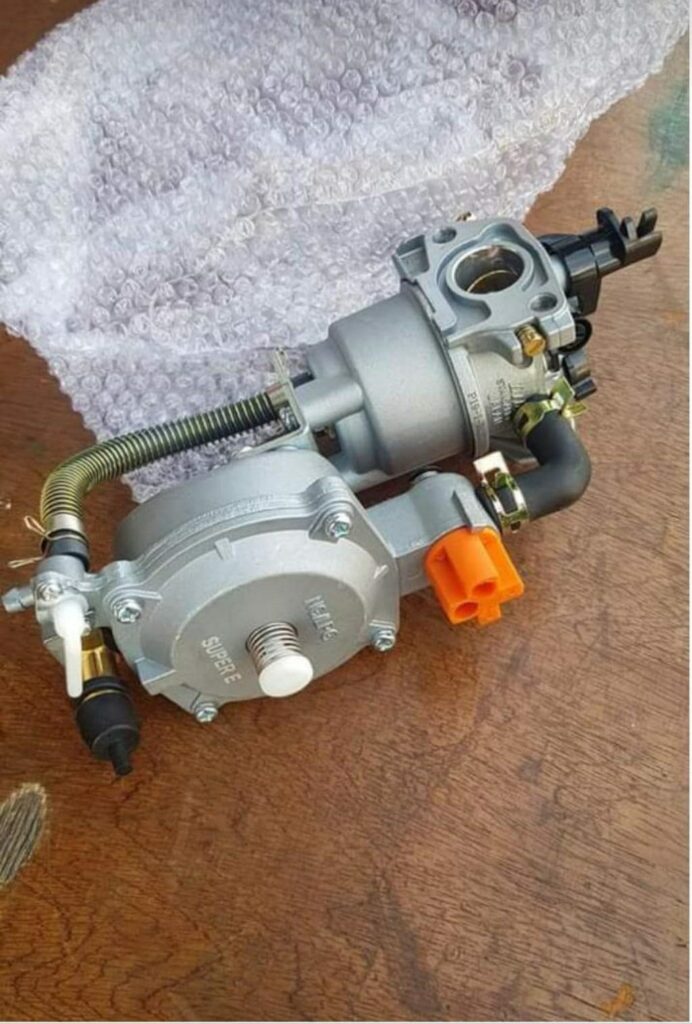
At the time Yusuf and Fagbohun bought their carburettors last month, they paid N35,000 each.
“I have heard about the use of carburettor and gas to power generators years before now, but due to the high cost of gas at the time, I did not switch. When the government removed the fuel subsidy, I had to think of alternatives,” said Fagbohun.
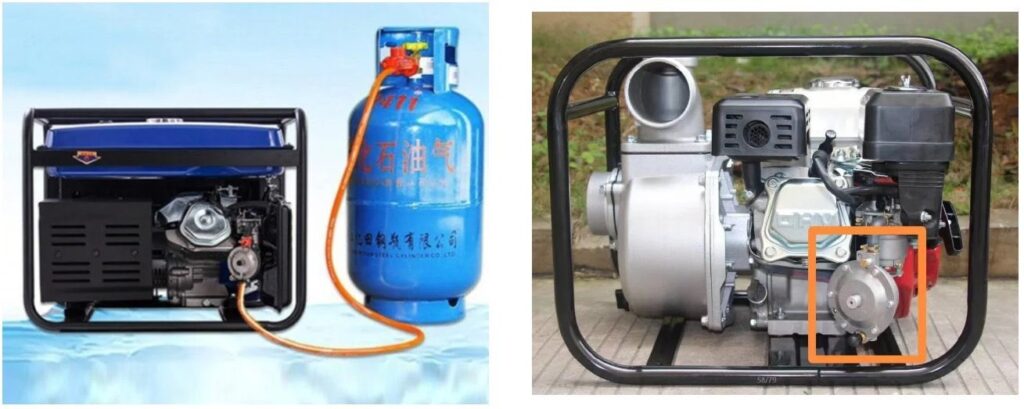
Initially disappointed by the expense, Yusuf would soon realise that the investment was worthwhile. He now spends less than N15,000 daily to power his generator with gas.
“After the subsidy removal, I spent N15,000 on petrol, and it only lasted for nine hours. But on switching to gas, I spend N5,000 on gas that runs for approximately five hours,” Yusuf told FIJ.
“For me, the gas-powered option is a better alternative compared to buying fuel at N500 and above. Besides, there will be a continuous reduction in the price of gas, so this option will keep getting better.”
Fagbohun’s experience mirrored Yusuf’s. Previously, three litres of fuel would barely last an hour, but with N1,500 worth of gas, he could enjoy three hours of power.
Raphael Nwachukwu, the owner of a Lagos-based company that specialises in generators and spare parts, explained that powering generators with cooking gas instead of petrol is not only cheaper but also safer.
Nwachukwu made FIJ understand that depending on the appliances connected to the gas-powered generators, this option is more economical than petrol-powered generators.
READ ALSO: FULL TEXT: Tinubu’s Democracy Day Speech
“Two litres of petrol cannot last for up to five or six hours, but one of my customers, who owns a betting shop, uses two kilogrammes of gas, and it lasts for 11 hours. Five litres of fuel cannot last till the next day, but gas will. Five kilogrammes of gas will power your generator for more than 12 hours,” he revealed.
While the use of carburettors is not new, according to Nwachukwu, a noticeable surge in demand occurred immediately after the increase in fuel prices. He anticipated that if gas prices continue to decline, a significant portion — around 70 to 80 percent — of generator owners would switch to gas.
HIGH DEMAND FOR SOLAR INSTALLATION
In addition to carburettor conversions, FIJ discovered a rising demand for solar inverters. John Adeleke (not real name), a retiree, opted for an inverter system in June due to the rising cost of petrol. The entire installation cost N1.5 million, but it powered fans, bulbs, a television and a refrigerator.
“We used to fuel our generator with five to ten litres of petrol every day, but we had to switch to an inverter in June due to the increased cost of petrol,” Adeleke disclosed.
FIJ spoke with Paul Akinlusi, an Osun-based solar technician, who installed solar and inverter systems worth over N10 million in three weeks. This, according to him, was a great feat in such a short time in his five-year solar career.
FIJ understands that the demand for solar and inverters continues to increase.
Akinlusi was the same technician who installed the inverter at the retiree’s house. He said he used to tell his clients that they would recoup their investment within eight to ten years. But with the current cost of fuel, users can recover their investment within three years.
“If a family spends spend N5000 on fuel for 300 days in a year, that’s N1.5 million. But if the family would rather invest it in solar, they will recover their cost of investment within a short period,” explained the solar technician.
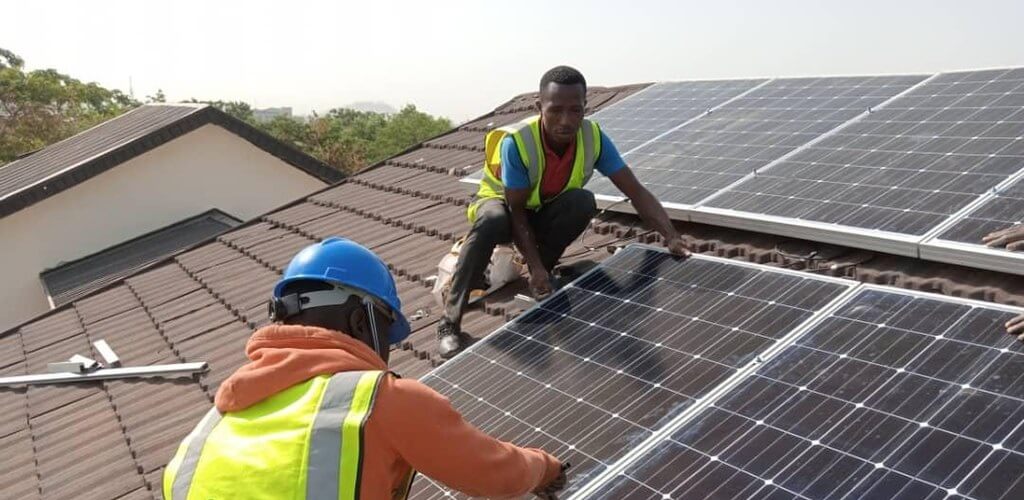
HIGH-CAPACITY SOLARS AND INVERTERS DON’T COME CHEAP
The national minimum wage for workers in Nigeria is N30,000. And with the high number of Nigerians living in poverty, installing a solar or an inverter can be a luxury for many.
Abdulwaheed Ibrahim, another Osun-based solar technician, shares the same sentiment as he told FIJ that although he noticed an increase in demand, the cost is too high for a one-time installation.
He said a basic solar installation that would power a fan, TV, phones and five laptops would cost N250,000. And for additional appliances like AC and refrigerator, one would spend at least N1.3 million.
Ibrahim also said one would budget N2.5 million upwards to enjoy 24 hours supply of solar inverter power. He, however, added that N1.5 million could still install a 24-hour system if the appliances are not much.
“For basic appliances like bulbs, two to three fans, phones and laptops, N1.5 million can give 24 hours of solar energy,” he said.
NYLON AND PLASTIC CAN BE TURNED INTO FUEL. CAN THIS BE THE FUTURE OF NIGERIA?
Two brothers, who are indigenes of Ekiti State, may have discovered a viable solution to Nigeria’s fuel issue. But their innovation has struggled to secure the funding it direly needs to enhance production capacity.
Back in 2015, Olayinka and Sunday Michael, the brothers now based in Ibadan, Oyo State, devised a means of converting nylon and plastic waste into diesel and petrol.
Their curiosity was sparked when they found that many Nigerians were repurposing nylon waste into usable products like bags and footwear.
“We were working at a pure water factory at the time and we were curious when we saw that people always came for the nylons that littered the factory,” Olayinka told this reporter.
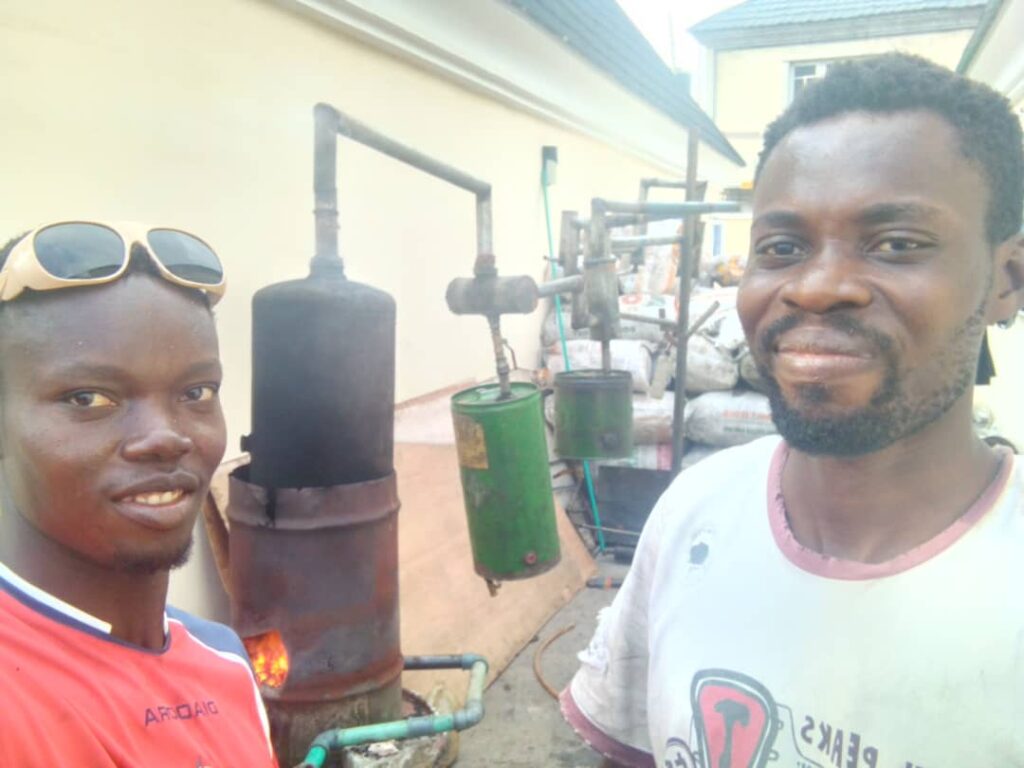
Drawing inspiration from their father’s background as an auto-electrical engineer, the siblings realised that nylon is a byproduct of petrochemical processes. This piqued their interest, and a seed of innovation was sown.
The brothers gained admission to different tertiary institutions in Oyo State, but they would later drop out of school due to financial constraints. They were not deterred as they did not allow this setback to kill their research interest.
“In 2015, we started saving up money to acquire the necessary equipment that will aid our research. We fully launched the idea in 2017 and we kept experimenting over and over again between 2017 and 2022. Last year, we finally got how to recycle nylon and plastic waste into diesel and petrol,” said Olayinka.
“The products we arrived at last year became useable with diesel engines, petrol engines and generators.”
HOW DOES IT WORK?
The brothers buy discarded nylon waste from water factories, grind them into shreds, dry the fragments, and put them in tanks to heat them up. At the point of heating, the vapour passes through a series of condensation units, where it then transforms into liquid form.
According to Olayinka, the first condensation turns to diesel, the second, which is a lighter gas turns into gasoline, and the next turns to petrol.
FIJ learned that the primary customers of this innovation are factory owners, who get to buy fuel at lower prices.
However, with the surging demand for their products amid the hike in fuel prices across the country, the brothers are unable to meet the needs of all their customers.
Their business model involves selling fuel at a slightly lower price than the market rate, such as N400 for petrol when the standard price is N500 and N700 for diesel compared to the regular price of N850.
“There has been an increase in demand since petrol increased to N500. Also, the amount of diesel we get is higher than petrol,” Olayinka revealed.
“We often use the petrol for our generator because the product is not always as much as diesel. But we always sell the diesel. We sell both for at least N100 lesser than the current price.”
On the cost of production, he said nylon waste is purchased at N50 per kilogramme, and 10 kilogrammes of nylon can produce up to seven litres of diesel (and more) and a litre of petrol.
PRODUCTION CAPACITY UNABLE TO MEET HIGH DEMANDS
Speaking with FIJ, Sunday, the other brother, said funding remains an obstacle that makes it difficult to meet the high demands from their customers.
He explained that if they invest N10,000 in raw materials they will make a hundred per cent profit.
“No matter the amount you invest, you will have a hundred per cent profit after production and sales. But we are unable to produce more because we have a small production capacity at the moment,” Sunday told FIJ.
He also said they are still repaying the debts incurred during their research and experimenting phase. To expand and increase production capacity, the brothers require substantial funding that has yet to materialise.
This lack of finance restricts their ability to satisfy their growing market demand. It also leaves them yearning for means to upscale their operations.
“Most of those who promised to fund our research have not shown commitment. We are also unable to obtain grants due to the stringent requirements. These are the challenges we are facing,” said Sunday.
“Our raw materials are locally sourced. Even the appliances we use to convert the nylon and plastic waste were built by us after many trials and errors.
“We built so many designs before we finally got the design that works perfectly. By the time we arrived at this, we had no more funds to make a bigger one that would increase our production capacity.
“With 500kg of raw materials, we should be expecting 250 litres and above, and we can even sell at much cheaper rates. Someone wanted us to supply 2000 litres of fuel every week, but we were unable to meet the demand.”
As the brothers presently produce fuel in their backyard, safety concerns loom over the production of such a volatile product as fuel.
“It is not safe and conducive doing this close to where we live, so we are working on setting up a proper factory that will not pose a risk to the environment,” Sunday noted.
ARE THESE COPING STRATEGIES BETTER ALTERNATIVES?
As Nigerians grapple with the outcome of the fuel subsidy removal, creative solutions like gas-powered generators, solar installations and nylon-plastic fuel are fast becoming viable alternatives.
The quest for cheaper and more sustainable energy sources has driven Nigerians like Ayoola Yusuf, Wasiu Fagbohun, and countless others to find innovative ways to navigate this new reality. But a question lingers in the minds of many: are these alternatives better and safe?
Although the potential is undeniable, these solutions seem like a drop of water in the ocean without the necessary support. And sadly, many Nigerians may be left out of adequate and affordable energy.
EXPERT SPEAKS
Amid the advocacy for clean, renewable and eco-friendly energy technology to reduce air pollution, solar energy can help mitigate climate change.
Moreover, FIJ spoke with Bala Zaka, an oil and gas expert, who opined that the use of gas-powered generators could result in a likely energy calamity and disaster.
Zaka said gas is highly flammable compared to petrol, and accidents involving gas-fueled generators can have far more severe consequences.
“If we have a petrol car accident that kills 10 people, an accident caused by gas will likely kill 500 people. Another thing many people are not taking into consideration is that all these fuels are derived from refining fossil fuels,” Zaka told FIJ.
“The political leaders are visionless and have left the citizens to fend for themselves in terms of health, education, security and even energy. This is unfortunate because taxpayers’ money should be utilised to support citizens.”
With respect to nylon and plastic-derived fuel, the expert said the government ought to actively engage with the likes of Olayinka and Sunday Michael and find ways to amplify their innovations.
“In developed countries, the government, through the ministry of science and technology, would have invited them to explain the process, bring in scientists and engineers to involve their expertise and then map out how to refine the innovation.”
He said Nigeria is suffering from leadership bankruptcy and docility as the political and economic leaders fail to support young talents like the Ekiti brothers for the greater good of the nation.
Meanwhile, findings by FIJ revealed that researchers at Washington State University (WSU) developed a catalytic process to convert polyethene to jet fuel and high-value lubricants in 2021.
Similarly, a 2019 report showed that a Ghanaian was able to turn plastic waste into fuel such as gasoline, diesel, kerosene and domestic gas for homes.
Subscribe
Be the first to receive special investigative reports and features in your inbox.


